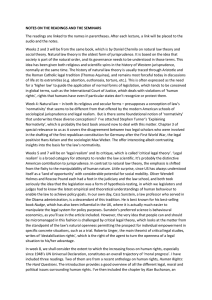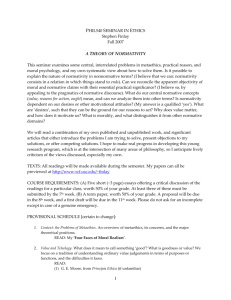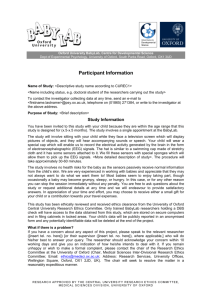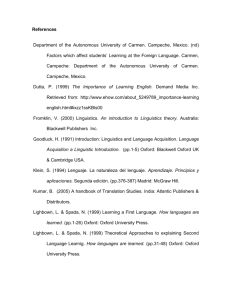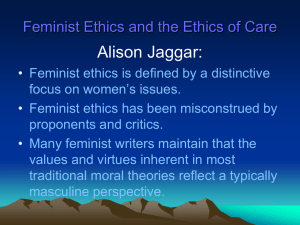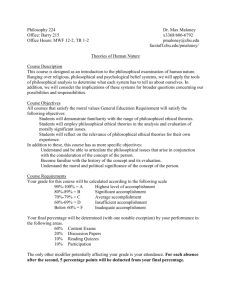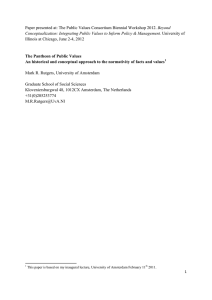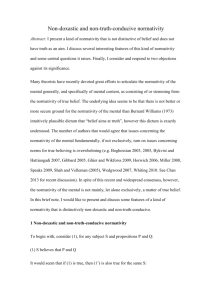normativity-phd-4-credit-seminar-syllabus-november
advertisement
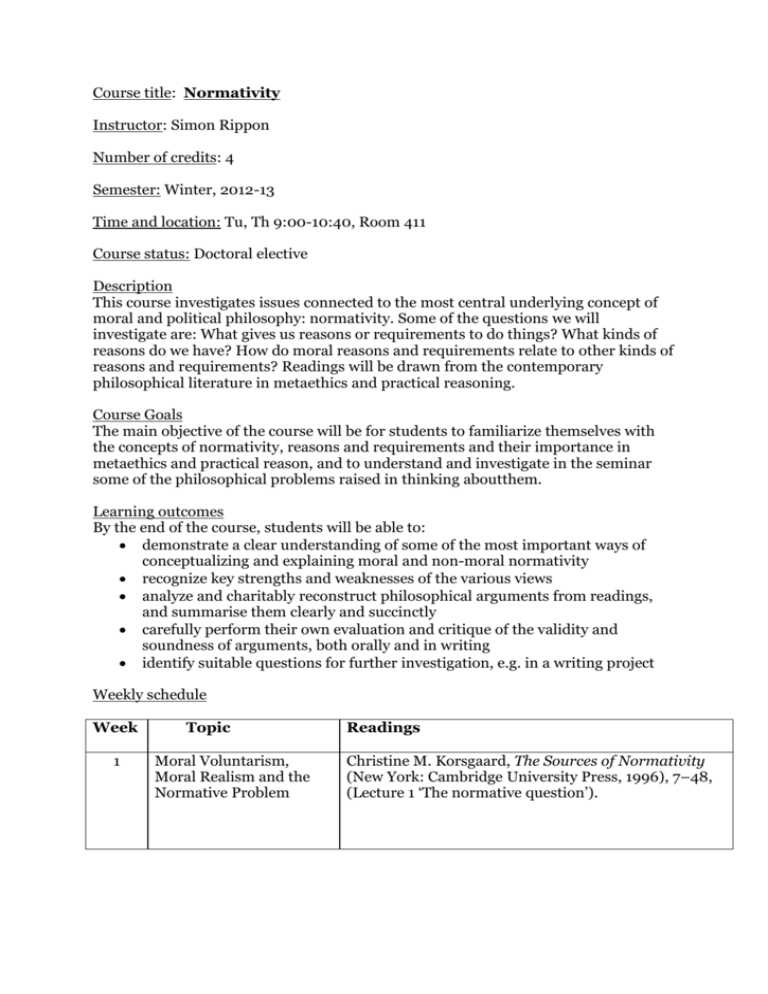
Course title: Normativity Instructor: Simon Rippon Number of credits: 4 Semester: Winter, 2012-13 Time and location: Tu, Th 9:00-10:40, Room 411 Course status: Doctoral elective Description This course investigates issues connected to the most central underlying concept of moral and political philosophy: normativity. Some of the questions we will investigate are: What gives us reasons or requirements to do things? What kinds of reasons do we have? How do moral reasons and requirements relate to other kinds of reasons and requirements? Readings will be drawn from the contemporary philosophical literature in metaethics and practical reasoning. Course Goals The main objective of the course will be for students to familiarize themselves with the concepts of normativity, reasons and requirements and their importance in metaethics and practical reason, and to understand and investigate in the seminar some of the philosophical problems raised in thinking aboutthem. Learning outcomes By the end of the course, students will be able to: demonstrate a clear understanding of some of the most important ways of conceptualizing and explaining moral and non-moral normativity recognize key strengths and weaknesses of the various views analyze and charitably reconstruct philosophical arguments from readings, and summarise them clearly and succinctly carefully perform their own evaluation and critique of the validity and soundness of arguments, both orally and in writing identify suitable questions for further investigation, e.g. in a writing project Weekly schedule Week 1 Topic Moral Voluntarism, Moral Realism and the Normative Problem Readings Christine M. Korsgaard, The Sources of Normativity (New York: Cambridge University Press, 1996), 7–48, (Lecture 1 ‘The normative question’). 2 Skepticism About External Reasons Bernard Williams, ‘Internal and External Reasons’, in Moral Luck: Philosophical Papers, 1973-1980 (Cambridge: Cambridge University Press, 1981), 101– 113. Philippa Foot, ‘Morality as a System of Hypothetical Imperatives’, The Philosophical Review 81, no. 3 (July 1972): 305–316. 3 Realist Responses Thomas M. Scanlon, What We Owe to Each Other (Cambridge, Mass.: Belknap Press of Harvard University Press, 1998), 37–77. Derek Parfit, On What Matters, vol. 1 (Oxford: Oxford University Press, 2009), 59–110 (Part 1 ‘Reasons’; ch. 3 ‘Subjective Theories’ and ch. 4 ‘Further Arguments’). 4 A Kantian Approach to Instrumental Reason Christine M. Korsgaard, ‘The Normativity of Instrumental Reason’, in Ethics and Practical Reason, ed. Garrett Cullity and Berys Gaut (Oxford: Clarendon Press, 1997), 215–54. 5 The Wide-Scope John Broome, ‘Normative Requirements’, Ratio 12, no. Approach to Instrumental 4 (December 1999): 398–419. Reason R. J. Wallace, ‘Normativity, Commitment, and Instrumental Reason’, Philosophers’ Imprint 1, no. 3 (2001): 1–26. 6 Debates about the WideScope Approach Nicholas Southwood, ‘Vindicating the Normativity of Rationality’, Ethics 119, no. 1 (October 1, 2008): 9–30. Joseph Raz, ‘The Myth of Instrumental Rationality’, Journal of Ethics and Social Philosophy 1, no. 1 (2005). 7 Internalism Again Mark Schroeder, ‘Instrumental Mythology’, Journal of Ethics and Social Philosophy 1, no. 1 (April 2005). Sharon Street, ‘In Defense of Future Tuesday Indifference: Ideally Coherent Eccentrics and the Contingency of What Matters’, Philosophical Issues 19, no. 1 (October 1, 2009): 273–298. 2 8 The Authority of Attitudes of Endorsement Korsgaard, The Sources of Normativity, 49–89, (Lecture 2 ‘Reflective endorsement’). Christine M. Korsgaard, ‘The General Point of View: Love and Moral Approval in Hume’s Ethics’, Hume Studies 25, no. 1–2 (1999): 3–41. 9 Sensibility Theory David Wiggins, ‘A Sensible Subjectivism?’, in Needs, Values, Truth: Essays in the Philosophy of Value, 3rd ed (Oxford: Clarendon Press, 1998), 185–214. 10 Neo-Aristotelian Naturalism Rosalind Hursthouse, On Virtue Ethics (Oxford: Oxford University Press, 2001), 192–266. 11 Kantian Constructivism Korsgaard, The Sources of Normativity, 90–166, Lectures 3 ‘The authority of reflection’ and 4 ‘The origin of value and the scope of obligation’. 12 Humean Constructivism Sharon Street, ‘Constructivism About Reasons’, in Oxford Studies in Metaethics, ed. Russ Shafer-Landau, vol. 3 (Oxford: OUP, 2008), 207–245. Requirements Regular attendance, carefully completing the assigned readings before class, and active participation in seminar discussions will be expected. In addition, there will be the following assignments: 1) An in-class presentation. Students will give a short (15-20 minute) presentation to introduce a selected topic. The presentation should include a brief overview of some of the main arguments and some questions and potential criticisms for discussion. Students may wish to prepare a handout or slides to assist their presentation to the class, but will not be required to do so. 2) A 2,000 word mid-term paper 3) A 4,000 word (maximum) final paper (topic must be approved by the instructor). Assessment 20% presentation; 20% mid-term paper; 60% final paper 3
